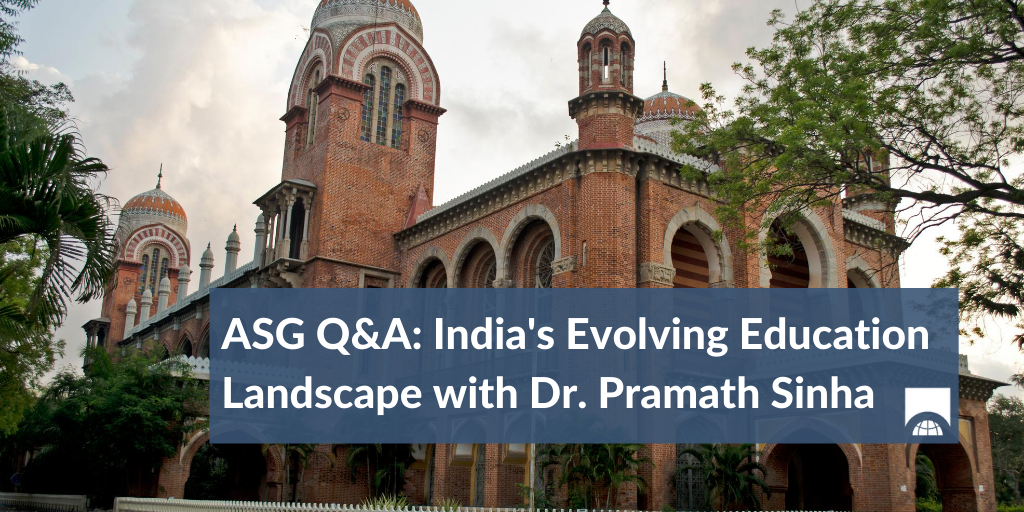ASG Q&A: India’s Evolving Education Landscape with Dr. Pramath Sinha

New Delhi-based Dr. Pramath Raj Sinha is a Senior Counselor at ASG and an expert on education in India. He has helped found multiple educational institutions in India over the past 20 years, including Ashoka University, online learning institution Harappa Education, and the Indian School of Business, of which he was the Founding Dean.
How has the education sector in India changed as a result of Covid-19?
“Covid-19 has resulted in three major shifts in education. First, it led to the mass adoption of online learning. Schools were forced to go online in mid-March, and it increasingly looks like they will remain online after the summer. Although this was a big disruption, people have been surprised by the remarkable acceptance of online education.
“Secondly, the digital divide in India has widened due to the lack of access for many people, whether that be lack of devices, connectivity, electricity, or just the right conditions at home. These factors have heightened the challenges of delivering learning online. While these challenges are global in some respects, they are accentuated in India because of the sheer scale and severity of the problem given the stage of India’s economy.
“The last major shift is that online education has brought about some exciting innovations. Universities are adopting new strategies and asking themselves, "How do we go beyond the boundaries of the physical university space?’ and ‘How do we expand to include new students, faculty, and courses that we could not typically offer?’ The concept of the university is being redefined, which brings with it a host of exciting possibilities.”
What steps is the government of India taking to facilitate online learning?
“On the K-12 side, the central government is focused on making supplemental online content available to schoolteachers and students. In 2017, the Ministry of Human Resource Development launched the Digital Infrastructure for Knowledge Sharing (DIKSHA) portal, which aims to amplify digital solutions in the classroom and equip teachers with digital content to supplement their course material. Similarly, the government is now launching a series of digital trainings for K-12 teachers. These programs have taken off since Covid-19 and received renewed attention.
“On the higher education side, the government had previously created a repository of online courses and made them available at no cost through its Swayam MOOCs portal. These courses are now being promoted and used as substitutes for lectures. Higher education in India is also becoming increasingly deregulated. India’s University Grants Commission (UGC) is now allowing institutions to deliver up to 40 percent of their content online, even after the Covid-19 crisis passes. The Commission also announced that the top 200 universities in India can issue degrees online. These are both remarkable developments coming from India’s higher education regulatory body.
“In addition to government efforts, private players have also stepped up and contributed to the growing education-tech industry. At the K-12 level, Khan Academy, Vedantu, and Byju’s have seen their usage skyrocket. Coursera and EdX have seen similar explosion in the numbers for higher education. Many of these private players have made their content free, at least through the Covid-19 period, in the hope that they will eventually be able to convert new users into paying customers.
“The combination of increased online content, increased access to content, and easing of government regulations in the sector has led to a staggering uptake in online educational learning at both the K-12 level and in higher education.”
What implications do these steps have for sectors other than education?
“The whole ecosystem around online learning is going to see exponential growth. This will also mean greater regulatory scrutiny as private players enter the market, particularly because education has always been a public service and the government will be very concerned with protecting the interests of students. Learners will also demand the best technology and services. If countries are allowing private players to access their students, they will demand the highest quality services.
“That being said, the private sector has a tremendous opportunity and I think we will see the rise of mega institutions that deliver content and teaching online. This already exists with the Khan Academies and Courseras of the market. In effect, these are massive global universities that transcend walls, borders, and age groups. I think the private sector is going to have innumerable opportunities for growth over the next couple of years, which is very exciting, but will also lead to natural tensions with the government and regulatory bodies. This opportunity extends to technology providers, testing and assessment providers, and online accreditation bodies.”
How will the government’s New Education Policy impact the education landscape?
“The policy makes several important changes, including the creation of a path for foreign universities to set up campuses in India, the formation of a single regulator for all institutions of higher education, and the launch of examinations that test core skills instead of placing an emphasis on rote memorization.
“Most importantly, the NEP emphasizes student-centric education that brings India in line with global best practices and is ultimately great for our students. Some of these much-needed changes include universalizing primary education, an emphasis on teaching in the students’ mother tongues, and transitioning to a more holistic, multi-disciplinary academic experience.”
About ASG
Albright Stonebridge Group (ASG) is the premier global strategy and commercial diplomacy firm. We help clients understand and successfully navigate the intersection of public, private, and social sectors in international markets. ASG’s worldwide team has served clients in more than 120 countries.
ASG's South Asia Practice has extensive experience helping clients navigate markets across South Asia. For questions or to arrange a follow-up conversation please contact Isabel Udell.
